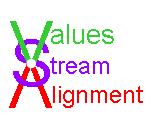Archive for category Measurement systems
It’s the mindset, then the measurement!
Posted by valuesstreamldr in Measurement systems, Systems on July 10, 2011
Mark Graban @leanblog recently tweeted several articles about the Atlanta School district’s recent cheating scandal. Here is the latest reference article.
The report details a “culture of fear, intimidation and retaliation” that pushed teachers to cross ethical lines and cover up their involvement when confronted.
This situation clearly demonstrates that what is valued by an organization drives what gets measured. However, values when not anchored to guiding principles can create systems that drive good people to exhibit inappropriate, even illegal behaviors. Apparently, the educators in Atlanta and in other school districts have been driven by a “results at any cost” culture that led them to forget that their purpose is to educate the children, not just pass them. Misaligned measurement, recognition and compensation systems drive the wrong behaviors in employees.
The Shingo Prize transformation model illustrates this relationship between Guiding Principles, Values, Systems, Tools and Results.
Nearly 20 years ago, I was a new cost analyst at Ford’s Cleveland Engine Plant 2. I was completing my MBA and writing my research paper on the implementation of a team based approach to manufacturing at Ford using lean manufacturing.
Our plant manager, Gifford Brown, told me that the biggest barriers to our success would be our labor and overhead reporting system and our recognition and compensation systems. Labor and Overhead budgets drove managers to produce at any cost and put the emphasis on building inventory and accepting poor quality – the biggest forms of wastes in a lean world. Our compensation systems were built to reward managers for meeting their budgets, so when they were asked to support a team-based system, they were wary of changing the behaviors that had resulted in annual raises in the past. We couldn’t expect behaviors to change, until we changed our systems.
Our finance team benchmarked other Ford plants that had met their budgets over the past 5 years, including an annual task, and found that although they had met their budgets; their actual costs had continued to rise year over year. They were good at generating authorization, not so good at reducing costs.
We formed a cross-functional team of managers from production, quality, finance, maintenance, and engineering to develop a new measurement system that took the emphasis off of labor and overhead budget results and placed the emphasis on input and process measures of Safety, Quality, Delivery, Cost, and Morale. We were still required to report our plant’s labor and overhead performance to Dearborn; however, we took the emphasis off of departmental budgets.
Gifford invited Carl Thor, a well-known author and authority on measurements to come to our plant to review our work and offer his insights. During our discussion, our Controller seemed uncomfortable with the discussion. He knew labor and overhead budgets-he “controlled” them, he wasn’t as sure that tracking planned maintenance vs. crisis maintenance, or first-time through, or the most difficult to understand – Employee morale would lead to better financial results. I remember him asking, “but how will we measure it?” It was then that I first understood that “It’s the mindset, then the measurement.” If we could get people focused on the right things, we could find a way to measure it.
One of my favorite questions to ask employees is “were you successful yesterday?”, then following up with “How do you know?” Creating the right vision of success must come before you attempt to measure it, however, once success is defined and understood by all, you must be able to measure it.
CEP 2 developed our new measurement system. We successfully implemented a team-based structure, created a behavior-based recognition system and the plant earned the Shingo Prize.
When teachers start cheating, the system is broke. There needs to be a re-alignment of our expectations of our public schools and teachers, how we measure success and a re-thinking of how teachers are recognized and rewarded for their work. It will not be easy, but it is required if a measure of our success as a country is the education of our children!

